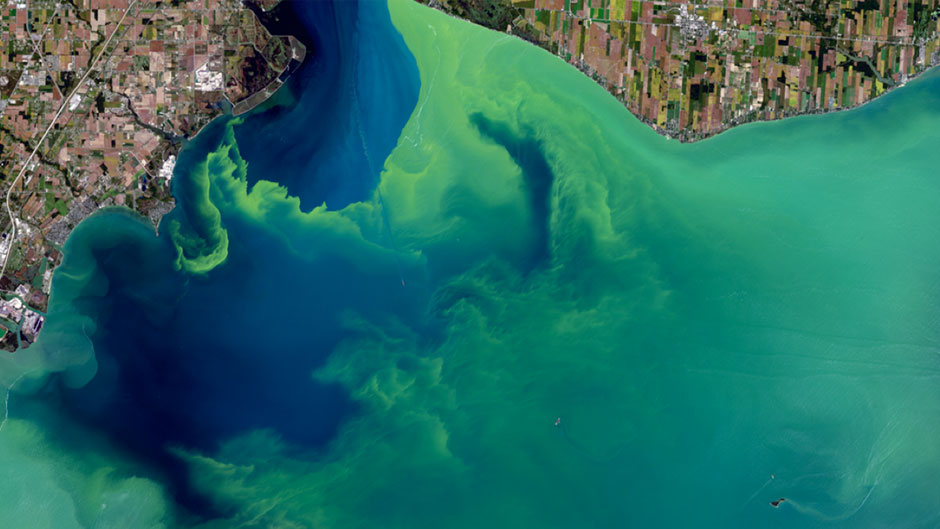Imagine a world where hurricane warnings are easy for anyone to understand and act upon; where automated web robots police terrorist organizations online; where doctors can halt the transmission of HIV/AIDS to substance abusers; where healthy coral reefs defend our most vulnerable coastlines, and ocean and human health are mutually protected and improved.
Five interdisciplinary teams committed to creating such a world are the inaugural winners of the grant competition sponsored by the UM Laboratory for INtegrative Knowledge (U-LINK), the new University-wide platform designed to foster interdisciplinary collaboration and facilitate new approaches to difficult problems.
"Today’s most pressing issues require a multidisciplinary approach,” President Julio Frenk said in congratulating the winning teams. “In order to find comprehensive solutions in a rapidly changing world, we need all scholars to work together. The University of Miami is poised to lead in the area of interdisciplinary inquiry, and U-LINK is an essential piece of our strategic plan that will lead us into a new century.”
Provost Jeffrey L. Duerk, who over his academic career has collaborated with multiple teams from multiple disciplines, called U-LINK the U’s first significant attempt to bring disciplines together and become leaders in understanding the critical elements teams need to pursue successful interdisciplinary research.
“We are not only tacking the big problems but also sharing best practices about effective interdisciplinary teams,’’ Duerk said.
Chosen from a total of 42 team applications, each of the five teams have the benefit of a two-day Science of Team Science Workshop—to learn the challenging art of interdisciplinary collaboration—and access to the U-LINK collaboration space at Richter Library, a UM librarian, and research consulting services. They’ll also receive $40,000 in initial funding to provide faculty salary support.
Another three teams were designated as U-LINK Fellows and, except for funding, are eligible to receive the same benefits to pursue their proposals, which range from uniting researchers of microbial symbiosis to exploring resiliency for children born in poverty.
John Bixby, vice provost for research and U-LINK’s accountable lead, and Susan Morgan, associate vice provost for research development and strategy, said members of the U-LINK Action Team were ecstatic about the number of proposals they reviewed. “In our dreams we thought we’d get maybe 20, and we received 42,” Morgan said. “The five teams chosen for phase 1 funding, which is designed to help them develop as teams, have the potential to truly make a real difference.”
The winning proposals and teams are:
HURAKAN: Improving Hurricane Risk Communication for Vulnerable Populations
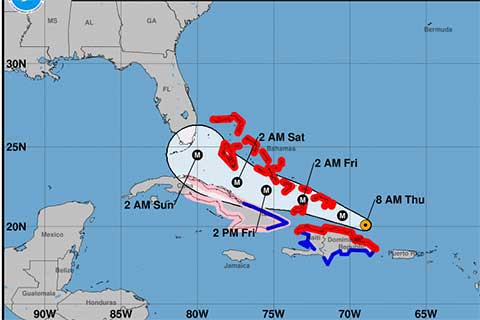 Named for the Mayan and Taino god for whom the word hurricane is derived, this proposal draws from a number of fields—including meteorology, environmental anthropology, decision science, and community engagement—to address a critical gap in visual hurricane forecast products: making them easily understood by the public, particularly in underserved communities.
Named for the Mayan and Taino god for whom the word hurricane is derived, this proposal draws from a number of fields—including meteorology, environmental anthropology, decision science, and community engagement—to address a critical gap in visual hurricane forecast products: making them easily understood by the public, particularly in underserved communities.
“The goal isn’t to change how forecasts themselves are made, but how these forecasts, which are based on complex analyses and models, can be effectively conveyed to the general public so citizens can make the right decisions in terms of protecting their lives and property,” said team member Alberto Cairo, assistant professor in the School of Communication, who noted the familiar but often confounding cone of uncertainty will be among the many elements of the team’s exploration.
“We believe that the public often misunderstands the visuals used to present this kind of information to them, so we hope this project will provide some advice on how to improve them,” he said.
Other team members include: Kenny Broad, professor at the Rosenstiel School of Marine and Atmospheric Science and director of the Abess Center for Ecosystem Science and Policy; Barbara Millet, research assistant professor in the School of Communication; Scotney Evans, associate professor in the School of Education and Human Development; and Sharanya Majumdar, professor and associate dean of graduate studies at the Rosenstiel School.
Systems Approach to Controlling the Online Rise of Extremism (SCORE)
 Combining the know-how of nine faculty members from eight disciplines, this proposal advances the new methodology that three team members previously published in the journal Science to understand the online ecology of extremism and hate speech through a combination of big data and complex network systems science.
Combining the know-how of nine faculty members from eight disciplines, this proposal advances the new methodology that three team members previously published in the journal Science to understand the online ecology of extremism and hate speech through a combination of big data and complex network systems science.
SCORE broadens and generalizes that earlier pilot study led by Physics Professor Neil Johnson by going beyond the numbers and focusing on online narratives and content. By targeting the wide range of extremist hate groups and hate-speech forums across U.S. social media outlets, investigators hope to determine how extremism develops online across platforms, target groups, and languages, and to suggest technological, social, and legal avenues to control and curb its impact.
“By embedding this know-how built on solid science as opposed to guesswork, SCORE will ultimately be in a position to develop effective automated software bots that circulate in the online space to do the policing,” the team wrote in its proposal.
In addition to Johnson, team members include Elvira Maria Restrepo, assistant professor of geography, Stefan Wuchty, associate professor of computer science; Michael McCullough, professor of psychology, and John Funchion, associate professor of English, all in the College of Arts and Sciences; Mary Anne Franks, professor in the School of Law; Michelle Seelig, associate professor in the School of Communication; and Manohar Murthi, associate professor, and Kamal Premaratne, professor, both in electrical engineering and computer engineering in the College of Engineering.
Advancing Interdisciplinary Research on the Microbiome to Optimize Health
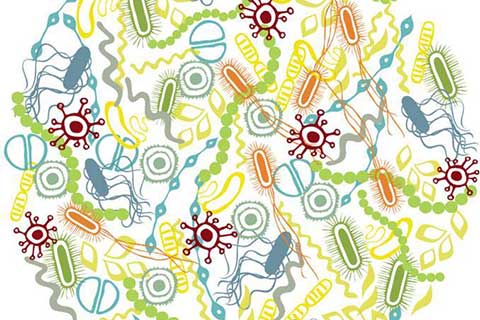 This proposal aims to build a translational research platform to better understand the role that abnormalities in the microbiome—the large, diverse populations of bacteria, viruses, and fungi that occupy almost every surface of the human body—play in the development and progression of chronic diseases, beginning with HIV/AIDS.
This proposal aims to build a translational research platform to better understand the role that abnormalities in the microbiome—the large, diverse populations of bacteria, viruses, and fungi that occupy almost every surface of the human body—play in the development and progression of chronic diseases, beginning with HIV/AIDS.
Team members hope that by pinpointing the underlying mechanisms that dysregulate the microbiome—leading to what’s known as dysbiosis—in substance abusers with HIV/AIDS, they will discover a common biological pathway that increases the risk for chronic diseases, and the potential for developing behavioral and biomedical interventions to halt their development, or progression.
“The efforts of our team to begin to address this interdisciplinary area of scientific inquiry in substance users are a crucial first step to build a vibrant portfolio of research targeting dysbiosis to optimize health outcomes,” said team member Adam Carrico, associate professor of public health sciences at the Miller School of Medicine.
Other team members include: Miller School faculty Sabita Roy, professor of surgery; Maria Alcaide, associate professor of medicine; Hansel Tookes, assistant professor of medicine; Savita Pahwa, professor of microbiology and immunology, of pediatrics, and of medicine; and Xi (Steven) Chen, associate professor of public health sciences; as well as Michael Antoni, professor of psychology in the College of Arts and Sciences.
Engineering Coastal Resilience Through Reef Restoration: Reduction of Wave Energy by Reef Structures and Impacts on Storm Surge and Infrastructure
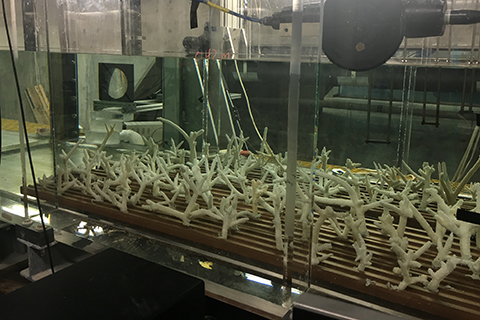 For this proposal, UM experts who were working independently on different aspects of coastal resiliency are joining forces to explore ways to restore green infrastructure—mangroves, seagrasses, and coral reefs—to protect coastal communities from ocean waves, increased flooding, storm surge, and sea-level rise, all exacerbated by climate change.
For this proposal, UM experts who were working independently on different aspects of coastal resiliency are joining forces to explore ways to restore green infrastructure—mangroves, seagrasses, and coral reefs—to protect coastal communities from ocean waves, increased flooding, storm surge, and sea-level rise, all exacerbated by climate change.
By combining their expertise, team members plan to develop better strategies for restoring green infrastructure through numerical and physical modeling, field validation studies, and wind-wave experiments in the Rosenstiel School’s SUSTAIN—SUrge STructure Atmosphere INteraction—laboratory, the 38,000-gallon tank that can simulate hurricane-force winds, sea spray, and storm surge.
As team member Diego Lirman, associate professor of marine biology and ecology, noted, “Miami-Dade County is spending millions of dollars to mitigate impacts of waves, storm surge, and flooding by deploying pumps, raising streets, and building sea walls. But green infrastructure provided by coastal ecosystems like healthy coral reefs, mangroves, and seagrasses can mitigate the impacts of climatic hazards in a more efficient and cost-effective manner.”
Other team members include: Andrew Baker, associate professor of marine biology and ecology, and Brian Haus, professor of ocean sciences, both at the Rosenstiel School; and Landolf Rhode-Barbarigos, assistant professor of civil, architectural, and environmental engineering at the College of Engineering.
Integrating Oceans and Human Health Sciences
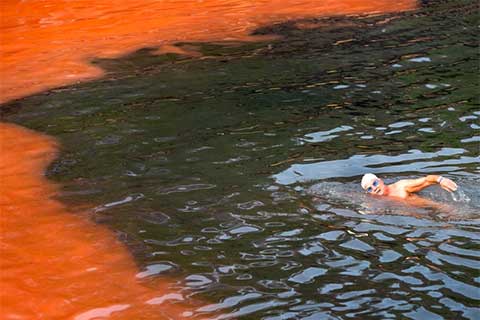 This proposal brings together biomedical researchers, ocean scientists, and engineers to explore the positive effects the ocean has on mental and physical health, as well as the risks posed by environmental and climatic changes to such “blue” environments.
This proposal brings together biomedical researchers, ocean scientists, and engineers to explore the positive effects the ocean has on mental and physical health, as well as the risks posed by environmental and climatic changes to such “blue” environments.
Team members initially plan to focus on novel areas of research in the growing field of oceans and human health sciences particularly relevant to Florida—the risks posed to people who inhale toxic aerosol particles released into the air by harmful algal blooms often triggered by fertilizer washing into coastal waters.
“Most research has focused on human exposure to algal toxins in the water or seafood. With the exception of brevotoxin (produced by the Florida red tide), little is known about the health effects of breathing aerosols with other algal toxins in them,” team members noted. “Our findings will be used to encourage engagement with natural blue environments while also helping to devise strategies to lower risks.”
The team includes: Alberto J. Caban Martinez, assistant professor, David Lee, professor, and Kristopher Arheart, associate professor, all in public health sciences at the Miller School; Sharon Smith, professor emeritus, Larry Brand, professor of marine biology and ecology, Cassandra Gaston, assistant professor of atmospheric sciences, Brian Haus, professor of ocean sciences, and Kimberly Popendorf, assistant professor of ocean sciences, all at the Rosenstiel School; Helena Solo-Gabriele, professor of civil, architectural and environmental engineering in the College of Engineering; and James Klaus, associate professor of marine geosciences in the College of Arts and Sciences.
U-LINK FELLOWS
The three other teams selected as U-LINK Fellows and their projects are:
Uniting Researchers of Microbial Symbiosis at UM (Symbiosis@UM), with Alexandra Wilson, professor of biology; James Klaus, associate professor of marine geosciences; Michelle Afkhami, assistant professor of biology; and Helena Solo-Gabriele, professor of civil, architectural and environmental engineering.
Childhood Poverty: Pathways to Resiliency, with Lynn Perry, assistant professor of psychology; Daniel Messinger, professor of psychology; Chaoming Song, assistant professor of physics; Lynne Katz, research associate professor of psychology; and Marie Guerda Nicolas, professor of education and psychological studies.
Reproduction of Race in Miami, with Jafari Allen, associate professor of anthropology; Laura Kohn-Wood, professor of educational and psychological studies; Donette Francis, associate professor of English; Germane Barnes, senior lecturer in the School of Architecture; Sophia George, research assistant professor in obstetrics and gynecology; and Ta-Shana Taylor, lecturer in geological sciences.
A fourth team of fellows declined their designation to pursue external grant funding for their project, which is focused on mapping, visualizing, and understanding the 3D evolution of complex systems.
And that, Morgan noted, is the ultimate goal of U-LINK grants—to develop the prototypes and data that will support external grant applications for research that has great potential to tackle some of the world’s most complex problems—problems that require multidisciplinary solutions.
“It’s like the parable of the blind men touching the elephant,” Morgan said. “There are so many different facets of large-scale problems, and each discipline has a little piece of the puzzle. We need to put all the pieces together not only to create a more comprehensive picture, but a more innovative set of solutions.”
